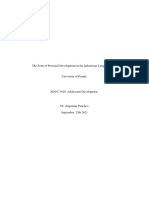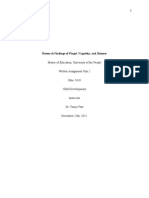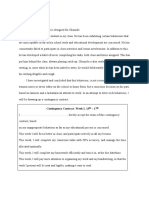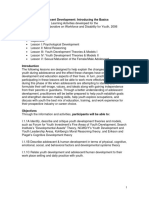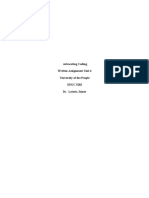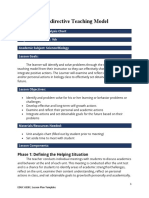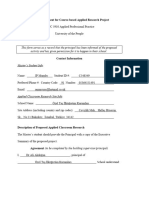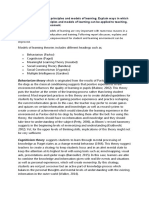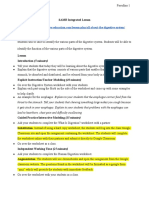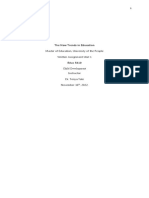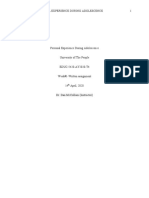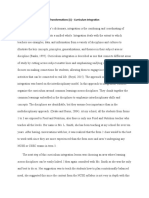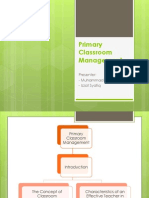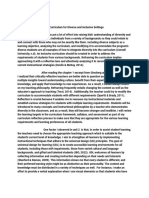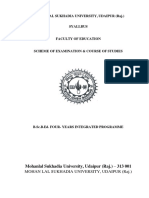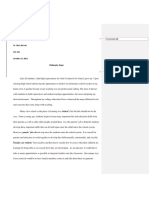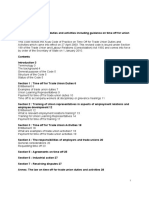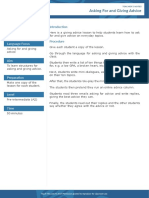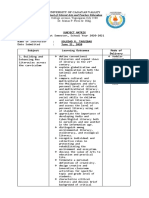1
Writing Assignment - Unit -1
University of People
� 2
Question – 1 In the third paragraph of page 301, Eisner asks “Are students encouraged to
wonder and to raise questions about what they have studied?” It is a thought provoking
question for educators by Eisner because students are not encouraged to wonder and raise
questions in all the classrooms. However in my work experience at the current school, I have
seen many teachers allowing the children to raise questions especially during the subject
“Environmental Studies” wherein it is about the world around them. I observed teachers asking
more open-ended questions instead of teachers asking test questions to students to understand
how much students have understood the concept. Some teachers also asked questions to children
after reading a story from the book. The questions asked by teachers required the students to
empathize with characters of the story and also imagine themselves in a similar situation.
Teachers actually pause for 5 to 10 seconds after they have asked a question and did not take
answer from the first student to raise hand to encourage students to think more before formatting
their answers. According to the researchers at the University of Michigan, "Examining
conversational exchanges, and in particular children's reactions to the different types of
information they get from adults in response to their own requests, confirms that young children
are motivated to actively seek explanations," "They use specific conversational strategies to
obtain that information. When preschoolers ask 'why' questions, they're not merely trying to
prolong conversation, they're trying to get to the bottom of thing." (Frazier et al, 2009,
November 13, Child Development, 80 (6): 1592 ). Allowing students to ask questions actually
motivated them to seek out knowledge in the topic they were interested in and eventually student
enjoyed the entire process of learning. I felt it also help students to form link between pieces of
information and also gave them confidence to express their own views on the topic.
� 3
Question – 2 In the sixth paragraph of page 303, Eisner asks “Can we create schools that take
the professional development of teachers seriously?” Through this question Eisner is hinting
us the importance of professional development of teachers seriously as not all schools take it
seriously. Many schools do not really invest money & time in professional development of
teachers as they admit that professional development of teachers is the last thing on their mind in
the middle of a busy schedule at school. As a school leader, I believe that school leaders should
offer more support and time for training. However it is also difficult to plan and execute creative
opportunities for teachers to continue to build their skills because as an educator we all have at
least one incident where professional development session has gone wrong. To avoid this, I
always take suggestions from my team (teachers & coordinators) on the topic of professional
development session. I prefer giving them a choice about what or how they learn and then I take
feedback at the end of the session. After they implement their learning’s from the session, I ask
them what worked and what did not work. This helps teachers to take ownership of their growth
and learning and helps us make sure that the learning’s are implemented in the classrooms.
Pajares (1992) affirms that “attention to the beliefs of teachers and teacher candidates should be
a focus of educational research and can inform educational practice” (p. 307).I also believe in
creating an individual professional development plan and discussing with the teacher. We
together create individual learning goals for teacher and chalk out clear steps to achieve the
goals. We discuss the strengths of the teacher and also discuss the areas the teacher has to work
on. Based on the areas identified, we decide on the course/workshop that teacher needs to do.
Apart from this, I do share lot of articles and free courses with teachers for them to read and
build their skills. I believe that schools should offer more support and time for training, but
teachers also need to take responsibility for their own growth. Without a doubt, the improvement
� 4
in teachers’ day-to-day practices will result in better learning by their students. “In education,
research has shown that teaching quality and school leadership are the most important factors in
raising student achievement” (Mizell, et al 2010).
Question – 3 In the eighth paragraph of page 303, Eisner asks “Are parents helped to
understand what their child has accomplished in class?” In this context of his article, Eisner
implicates that such opportunities occur rarely in school scenarios. Actually in most of the
schools, report cards have the grades against the subjects which are shared by parents. The
purpose of a report card is to inform a child’s parents of his or her academic progress during the
school year. For most parents it is the most important document that they receive from the
school. However most of the times report cards focuses only on academics and do not focus
much on the child’s accomplishments and skills they have horned. “The problem with our report
cards is that grades and comments are always encoded and not standard-referenced. Current
report cards say too little about the specific tasks the student has actually done or not done, and
to what specific and verifiable level of performance. And they say too little about progress
toward exit-level standards.” (Grant Wiggins). According to me, the report card should help
parents understand the child’ accomplishment in class. The report card should clearly have a
summary of child’s achievements along with some examples of child’s learning. It should also
compare the child’s learning & skill from previous term. The report should identify strengths and
weaknesses in the diverse priority areas, topics, skills, and understandings that make up a
subject. The key to report card, then, is to ensure that grades, scores, or any other system can be
effectively translated by parents. Comments may well be desirable. They provide rich, insightful
detail, but they do not replace the facts about performance that are summarized in scores and
grades. It is important to provide parents an orientation of the report card and grading system of
� 5
the school. We need to help families understand how teachers and others in the school use data
and why this information is valuable. For instance, explain to parents that teachers use data to
adapt teaching strategies to students’ needs as well as to help students work toward specific
learning goals. Knowing how teachers use data helps reassure families that the data are used in
meaningful ways and that their child is not seen as just a set of numbers. We can also ask parents
if the student progress notes or school-wide data reports that they receive are easy to understand.
We need to find out what information parents find valuable, and ask if there are other types of
data that they would like to receive in these reports. To gather more feedback about their ideas
and needs, consider holding a parent focus group or conducting a parent survey. While
communication with parent about child’s progress we need to focus conversations on the
potential for growth and improvement. Use the student’s progress data to co-develop an action
plan for growth, and discuss the specific roles that you, the parent, and the student will play in
achieving goals. We also need to provide parents with resources to enrich their child’s learning,
and help them understand the best way to use the resources.
Reference:
Society for Research in Child Development. (2009, November 13). When preschoolers ask
questions, they want explanations. ScienceDaily. Retrieved April 12, 2021 from
www.sciencedaily.com/releases/2009/11/091113083254.htm
Mizell, H. (2010). Why professional development matters? Oxford, US: Learning Forward.
Pajares, M. F. (1992). Teachers’ beliefs and educational research: Cleaning up a messy construct.
Review of Educational Research, 62(3), 307-332. https://doi.org/10.3102/00346543062003307.

